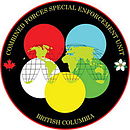- Combined Forces Special Enforcement Unit
-
Combined Forces Special Enforcement Unit - British Columbia Abbreviation CFSEU-BC CFSEU-BC Logo Agency overview Formed April 1, 2004 Employees 150[1] Legal personality Governmental: Government agency Jurisdictional structure Operations jurisdiction* Province of British Columbia, Canada Constituting instrument BC Police Act General nature Operational structure Headquarters 805 Boyd Street, Annacis Island[2] Elected officer responsible The Honourable Shirley Bond, Minister of Public Safety and Solicitor General Agency executive Superintendent Doug Kiloh, Chief Officer - CFSEU Parent agency RCMP "E" Division Website http://cfseu.bc.ca/ Footnotes * Divisional agency: Division of the country, over which the agency has usual operational jurisdiction. The Combined Forces Special Enforcement Unit - British Columbia (CFSEU-BC) (formerly the Organized Crime Agency of British Columbia[3] ) was established in 2004 to facilitate the disruption and suppression of organized crime in BC and to support municipal police department when public safety is deemed to be a priority. It is a part of the Royal Canadian Mounted Police (RCMP) "E" Division Federal Business Lines that is mandated to provide support and investigation into complex and diverse criminal activities in BC. It is modelled after other CFSEU units across the country and is currently staffed by RCMP officers and seconded officers from all 11 municipal police force in British Columbia.
As part of an integrated policing approach, CFSEU-BC had undergone undercover operations, seized firearms, illegal drugs, cash and provided support in the rescue of Graham McMynn, son of businessman Robert McMynn.[4]
Mandate
The primary mandate of the Combined Forces Special Enforcement Unit is to expose, investigate, prosecute, dismantle, and disrupt organized criminal enterprises. The second mandate is to share intelligence with partners and to cooperate with, and assist other organized crime enforcement units at the national and international levels.[5]
References
External links
Categories:- Law enforcement agencies of British Columbia
- Royal Canadian Mounted Police
- Canada stubs
Wikimedia Foundation. 2010.

